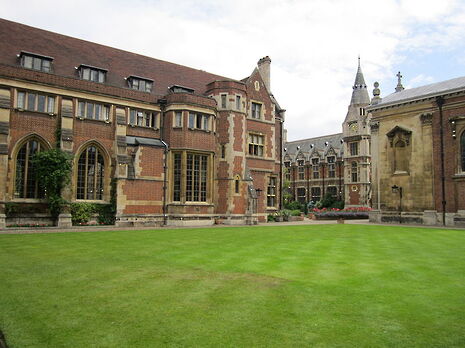Coyne’s apology is ill-considered and inadequate
Ronald Coyne should spend less time apologising to us, and more to those he humiliated says Alice Millington

I’ll admit it: since February, I’ve thought about Ronald Coyne quite a bit, and not just for the grotesquery of his action, although that did make me shudder. If I’m really honest, my thoughts were most often accompanied by a touch of morbidly-fascinated pity. ‘This kid has absolutely ruined his life’, I’d think to myself, and, ‘If he’s still at Cambridge, absolute hell must be awaiting him’.
Now, I cannot defend him in the slightest. But Ronald, I am sorry. I’m sorry that you’ve received online abuse, threats of violence, and a reputation that is burnt into the pages of the national press, the Internet, which may trail in your wake for a lifetime. But I’m more sorry that, when you were faced with a vulnerable person, your first instinct was to humiliate him rather than help him. Most of all, I’m sorry that you simply don’t seem sorry – or, at least, not for anywhere near the right reasons.
“His statement of regret was peppered with alarming omissions; most staggeringly, it omitted admittance itself.”
Yesterday’s long-awaited letter of apology ended a seven-month silence from Coyne and ushered in a new silence. His statement of regret was peppered with alarming omissions; most staggeringly, it omitted admittance itself. Coyne’s actions were unspeakable, and I can only assume that’s why he seemed to be unable to say them. It may have been “widely reported in the media” that he attempted to burn a banknote but hey, Ronald, this wasn’t just “reported” to have happened, you actually did it – and we needed to hear you say it.
The moment you distanced yourself from your crime – no earlier than in the very first line of your apology – was the moment it became about saving your own skin, instead of healing the wounds you had opened on others’.
In February, national media raced to report Coyne’s deed; the latest in a shamefully long line of Oxbridge elitism scandals. For better or for worse, Ronald Coyne’s name is famous. Ryan Davies’s name, the homeless recipient of the abuse, is not, because a vast tranche of privilege ensures that the housed are granted voices and the homeless are not. A two-person performance became a one-man show: a study of villainy, indeed, but nonetheless a solo act. In his letter Coyne apologises profusely for the “upset [he] caused [his] fellow students”, his “put[ting] the entire university in a negative light”, and for the effect that his behaviour had on Cambridge University “as a community”.
In the process, he catastrophically misses the point. We, the student body, were not the principal recipients of “the hurt caused” by his actions. Neither Ryan Davies, nor the homeless community, are even acknowledged in the letter, let alone given the privilege of an address in an apology that should be primarily dedicated to them.
Ultimately, Coyne can burn £20 notes in his bedroom for all I care. It’s a disgusting act, but it’s his bank account. What matters here is that he had an audience, and the identities of his witnesses. In referencing only geographical location in reference to his “attempt to set alight to a £20 note”, Coyne appears to fundamentally misunderstand the basis for the national outrage he has caused, rendering his apology as worthless to the people to whom it matters as banknotes clearly are to him.
However, Coyne is right about two things. Firstly, that – against the will of 23,224 online signatories on a petition for his expulsion – he is a Cambridge student. Secondly, that he’s extremely, extremely fortunate that I’m writing an article about his return to Cambridge. These are facts Coyne clings to, repeatedly, throughout his apology. Indeed, his entire statement of regret appears to centre around the idea that falling short of the ‘Cambridge student’ identity is his crime, and overlooks his failure of simple human morality.
He did behave in a way that was “contrary to the values of the university”, but, more importantly, he behaved contrary to the values of a decent society. By admitting shame only in his failure to live up to the values of “a great university”, he furthers the very fetishisation of Cambridge University that cultivates the kind of institutional privilege that allowed Coyne to feel entitled to perform his actions in the first place.
Let me make one thing clear, though: Coyne, you messed up big time – and your apology leaves much to be desired. But you don’t deserve for this to ruin your life. I really hope you can make the best of the second chance you’ve very fortunately been given.
 News / CUP announces funding scheme for under-represented academics19 December 2025
News / CUP announces funding scheme for under-represented academics19 December 2025 News / SU reluctantly registers controversial women’s soc18 December 2025
News / SU reluctantly registers controversial women’s soc18 December 2025 News / Cambridge welcomes UK rejoining the Erasmus scheme20 December 2025
News / Cambridge welcomes UK rejoining the Erasmus scheme20 December 2025 Features / Should I stay or should I go? Cambridge students and alumni reflect on how their memories stay with them15 December 2025
Features / Should I stay or should I go? Cambridge students and alumni reflect on how their memories stay with them15 December 2025 Film & TV / Timothée Chalamet and the era-fication of film marketing21 December 2025
Film & TV / Timothée Chalamet and the era-fication of film marketing21 December 2025










